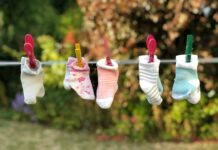 We have been talking about emotions and feelings with my three-year-old lately. My how quickly you forget the struggles of the stages after your first child grows out of them. The tantrums at three seem to be magnified and more frequent, and you can’t remember how you survived the first time around. But you did learn a thing or two from your experience with the first kid, and so you kind of have a general direction of where to go and how to navigate through some of their emotions.
We have been talking about emotions and feelings with my three-year-old lately. My how quickly you forget the struggles of the stages after your first child grows out of them. The tantrums at three seem to be magnified and more frequent, and you can’t remember how you survived the first time around. But you did learn a thing or two from your experience with the first kid, and so you kind of have a general direction of where to go and how to navigate through some of their emotions.
We had been working on potty training since my daughter was two and we celebrated like crazy when she would pee and poop on the potty, especially when she told us that she had to go. “Yay, I’m so proud of you! That makes me so happy.” Little did I know that soon these words would come back to bite me. My three-year-old has been having some setbacks in her potty training recently, and for a period of time, she was continuously having accidents. After multiple accidents in a day, I would yell in frustration and then she would say, “Mom, you’re not happy.” Over time, she continued to use the phrase until suddenly it seemed like it was used daily about every little thing. Sometimes she would ask, “Mom, are you happy?” and I really would be happy just doing whatever we were doing. But she would also ask anytime I was upset with her. I would reply to her yes, but then there were times I would lie, grit my teeth, and tell her that I was happy when I really wasn’t.
It was after a birthday party when it hit me the hardest. Both kids were sugared up on birthday sweets and still wild from their birthday party high. Before arriving home, they were both breaking down crying and whining in the car. By the time we got into the house, it was time to get ready for bed, which is when the meltdowns intensified. By that time, I was over it and I lost it. Finally, after things calmed down and the kids were ready for bed, my five-year-old came up to me and asked “Mom, are you happy?” Ouch. For some reason, this one hit differently. Maybe because it was coming from my oldest who understood more than my three-year-old. She knew at that moment that I was not happy and wanted to check to see if my mood had changed. This bothered me.
I sat up all night thinking of how terrible of a mom I was and how I could better handle when the kids ask me if I am happy. What was I doing wrong?
It wasn’t until recently that I started reading a great book on how to pause more and react less with my parenting; it has helped me navigate through all my anxious emotions and screaming outbursts. I have learned new things but have also been reminded of things that I might have already known, yet needed to work more on. There is power in our language, especially with our kids. The book explains how the words you use around and ABOUT your children actually shape their sense of space. I realized that nothing I was doing was wrong; I just needed to better communicate and explain WHAT I was feeling and WHY I was feeling it. I’m not a robot and it’s normal to have feelings other than happiness and I definitely should not have to try to hide those feelings from my kids. The main reason I picked up this book was to help gather more control over my yelling. I knew that if I wanted my kids to be able to come talk to me about the good, the bad, and the ugly, I needed to be more calm and approachable when things happened. I did not want them to be scared of my response or fear me if they had something important that they wanted to talk to me about.
We teach our kids how to express and work through their big feelings with us, so I need to work on better communicating mine (to an extent) with them. So instead of answering their question “Mom, are you happy?” with the short abrupt answer of yes or no, I need to take the time to pause and not give them my anxiety-driven response. I don’t want to teach them to respond to things that way. I will work on trying to respond with how I am truly feeling, the reason I feel that way, and calmly explain any other details regarding the situation.
 Parenting is hard and has its challenges, but it is also a journey that you learn and grow through each day. Kids aren’t born knowing how to express emotions and feelings. I hadn’t been doing a great job of teaching them with my own reactive behaviors. Unhappy feelings were nothing I needed to feel badly about or sorry for, but sometimes the pressures of motherhood can get to you. The good news is that all behavior patterns, no matter how ingrained, can be changed. It’s not an overnight fix, but I will continue to work on expressing and explaining my feelings with less of a reaction.
Parenting is hard and has its challenges, but it is also a journey that you learn and grow through each day. Kids aren’t born knowing how to express emotions and feelings. I hadn’t been doing a great job of teaching them with my own reactive behaviors. Unhappy feelings were nothing I needed to feel badly about or sorry for, but sometimes the pressures of motherhood can get to you. The good news is that all behavior patterns, no matter how ingrained, can be changed. It’s not an overnight fix, but I will continue to work on expressing and explaining my feelings with less of a reaction.



















